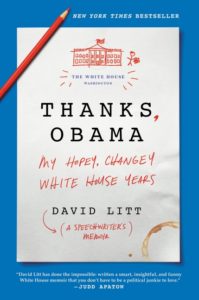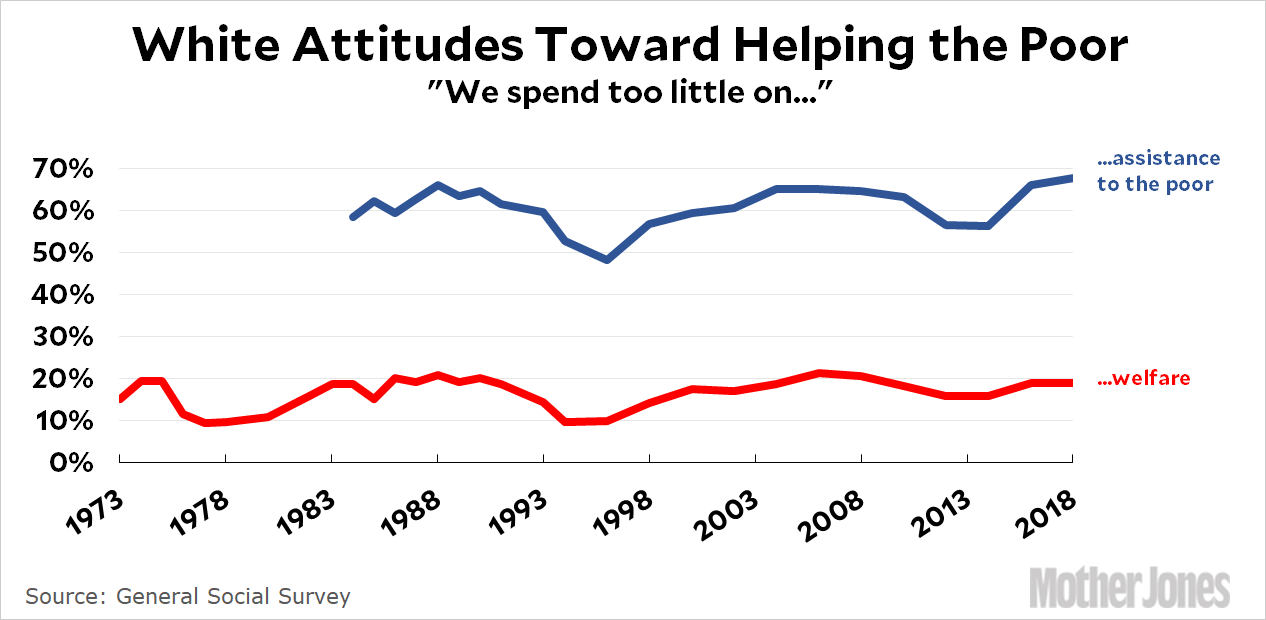It is not your job to tell us what we need, it is your job to comply with things we need to provide oversight over you. The day Richard Nixon failed to answer that subpoena is the day that he was subject to impeachment, because he took the power over the impeachment process away from Congress, and he became the judge and jury.
- Lindsey Graham,
House debate on the impeachment of Bill Clinton
12-18-1998
This week's featured posts are "Charity Liberalism and Justice Liberalism" and "Impeachment: On second thought ...".
This week everybody was talking about obstruction of Congress
This week Trump announced his intention to fight "all the subpoenas". That's an authoritarian position that, if he gets away with it, will fundamentally change our constitutional system. That was enough to change the position against impeachment that I announced last week.
Part of that obstruction is that Bill Barr is now backing out of his commitment to testify about the Mueller Report.
and the census
For several years now I've been chronicling the Republican Party's attempts to rule from the minority. Their positions on the issues are increasingly unpopular and demographic trends are against them, but rather than move with the country they've decided to change the rules to make their voters count more than other voters. Hence gerrymandering, voter suppression, felon disenfranchisement, and so on, plus removing all restrictions on the ability of the rich to buy elections. These factors pile onto the already anti-democratic parts of our constitutional system, like the Electoral College and the fact that small states get as many senators as large states.
As a result, a president elected with a minority of the vote can combine with a Senate majority elected by a minority of the country to appoint Supreme Court justices who will rubber-stamp these minority-rule tactics.
The latest move in that game is to rig the census. The Constitution is clear that the census is supposed to be the "actual enumeration" of "the whole number of free persons", and that the number of congressional seats and electoral votes each state gets is based on that number. It says nothing about citizenship or eligibility to vote, but excludes "Indians not taxed", i.e., those living in their own nations.
The Trump administration wants to add a citizenship question to the census,
which the government stopped asking in the 1950s because of the projected undercount in communities with large immigrant populations.
But to Republicans, that undercount isn't a bug, it's a feature: They want states with a lot of non-citizens to lose representation.
A lawsuit is trying to block that move, largely because it was made outside the process established by Congress. The suit has now reached the Supreme Court. Given the questions asked by the justices during the hearing, predictions are that the Court will back the administration on this, on a 5-4 vote decided by those judges appointed by this minority president and approved by this minority Senate.
and 2020
Biden is in, making 20 Democratic presidential candidates. Is that everybody now? Biden opened with this video. The message is all theme and no policy:
I believe history will look back on four years of this president and all he embraces as a aberrant moment in time. But if we give Donald Trump eight years in the White House, he will forever and fundamentally alter the character of this nation.
That's the biggest campaign-strategy split among Democrats so far: The Buttigieg/Beto candidates put values and narrative first, and the Warren/Sanders candidates have long lists of policy proposals.
I understand the argument for Biden: He won't scare away people in the center, so he's a good bet to hang on to those formerly Republican suburban voters who were responsible for the Democrats retaking the House in 2018. He has a working class image, so he should be strong in the industrial Midwestern states that put Trump over the top in 2016.
But here's something to think about: What does Biden bring to the table that Amy Klobuchar doesn't? And she doesn't have the baggage of Anita Hill, voting for the Iraq invasion, ...
Nate Silver rates Biden's chance at the nomination higher than any other current candidate, but still makes him an underdog against the field. Although Sanders leads in at least one poll, Silver's polling average has Biden at 28% and Sanders at 20%.
there’s a gap between where Sanders is polling and where Biden is, and empirically, it’s a relevant one. Based on historical data, we estimate that candidates with high name recognition who are polling at 20 percent (Sanders) in early national polls can expect to win their nominations about 15 percent of the time, other factors held equal. But candidates who are polling at 28 percent (Biden) win their nominations something more like 35 percent of the time, or roughly twice as often.
The interesting number in the new WaPo/ABC poll is that a majority of Democrats (54%) haven't picked a candidate yet, and they don't seem to be making up their minds very fast. (The same number was 56% in January.)
The Post-ABC poll, conducted largely before Biden’s Thursday campaign announcement, asked whom respondents support in an open-ended format that did not name any of the candidates. The results show notably lower levels of support than produced in polls that ask people to pick from a list of names.
So Biden leads the pack with 13% support and Sanders is second with 9% -- not the kind of numbers that should scare other candidates out of the race. (One of Nate Silver's points is that candidates who are already well-known have less room to grow their support. The undecided 54% know what Sanders and Biden are about, but they're still looking.)
If you chase the link to the poll questions, one of them seems a lot more significant than it actually is: 47% of Democrats say they're looking primarily for someone who agrees with them on the issues, while 39% say they're primarily looking for someone who can beat Trump. Here's why that result isn't interesting: Just about everyone I know thinks that the way to beat Trump is to nominate someone who agrees with them on the issues. I think the tail wags the dog here. If you like Bernie, you think he's the best bet to beat Trump. If you like Biden, you think he is, and so on down the line.
I think the best candidate to beat Trump is someone who threads the needle: progressive enough to motivate the base, but not scary to the suburban college-educated whites who had trouble deciding between Bush and Kerry in 2004 and probably voted for Hillary in 2016. Threading that needle was the secret to Obama's 2008 landslide: He held Kerry's voters, picked up some Bush voters, and motivated new people to come to the polls. Probably neither Biden nor Sanders is the person to pull that off in 2020, but I don't know who is yet. So I'm in the 54%.
One of the things that worries me in this crowded primary race is that candidates will take positions that will come back to haunt them in the general election. I'm not talking about core issues of the progressive agenda, like Medicare for All or free college. I mean hot-button issues that most of the country is not even considering, and that will produce an immediate "That's just wrong" reaction from a large segment of the electorate.
I feel like Bernie Sanders and Kamala Harris did that in their CNN town halls, in calling for felons currently in prison to retain their voting rights. Don Lemon specifically mentioned the Boston Marathon bomber, but Bernie affirmed that all prisoners should be voting. Harris responded with a less commital "We need to have that conversation."
That's an attack ad waiting to happen. Given the racial disparity in felony convictions, Democrats definitely need to make an issue out of restoration of voting rights after prison terms end. But in a crowded field, there's always a temptation to push a position too far. Murderers and rapists lining up to vote in prison is an image that will scare lots of otherwise persuadable people.
The homophobic dog whistles have started: Fox News' Geraldo Rivera describes Pete Buttigieg as a "the young buckaroo with flamboyant ideas". Flamboyant is a dog whistle for gay, the same way that inner-city is a dog whistle for black. Rivera makes it sound like Buttigieg is campaigning in one of Elton John's old costumes rather than a white shirt and dark tie. And which Buttigieg ideas are so "flamboyant"?
The principles that will guide my campaign are simple enough to fit on a bumper sticker: freedom, security, and democracy.
Abe Lincoln could have said that. Then again, he may have been gay too.
and Charlottesville
Biden's video begins with the Charlottesville neo-Nazi "Unite the Right" rally, and with Trump saying that there were "very fine people on both sides".
I think it's a good move for Democrats to keep reminding the country of this moment (the low point so far in Trump's national approval rating), because Trump can't really counter. He continues to wink-and-nod at the extreme right, even as he denies being racist. Racism is a key part of the attraction between Trump and his base, and he's never going to produce the whole-hearted denunciation that the majority of the country would like to hear.
He's still winking, still pushing a false counter-narrative in which good and decent Confederate sympathizers were "quietly" protesting the removal of a Lee statue when a few violent folks got out of hand -- as if that's what the Unite the Right rally was ever about.
All you have to do to refute that story is look at the posters that convinced people to attend. The headliner was Richard Spencer, the white nationalist leader who got mainstream attention after his Nazi-salute producing "Hail, Trump!" speech. Numerous posters included the white nationalist "You will not replace us!" slogan, which turned into "Jews will not replace us!" during the march. The Daily Stormer poster above is nakedly anti-Semitic.
So if you went to this rally intentionally, you knew what you were supporting. And if you happened to stumble in by mistake, the "Sieg Heil!" chants should have tipped you off. So I can assert with some confidence that the number "very fine people" in that torchlight parade was very close to zero.
Meanwhile, there's been another synagogue shooting, apparently committed by someone who buys into the kinds of conspiracy theories Trump has been pushing. But Trump himself takes no responsibility.
Speaking of Lee statues ... If you ever doubt that Confederate monuments are really monuments to white supremacy, consider who almost never gets memorialized: James Longstreet. He was a top Confederate general, arguably second to Lee in military significance. But after the war he supported Reconstruction, endorsed Grant for president, resisted the Lost Cause mythology, and urged Southern white politicians to cooperate with black politicians. That got him thrown out of the Confederate pantheon.
If you were trying to commemorate Confederate military history, you'd have as many monuments to Longstreet as you do to Stonewall Jackson, and way more than to KKK-founder Nathan Bedford Forrest. But if you were trying to celebrate the heroes of white supremacy, you wouldn't. The South didn't.
and you also might be interested in ...
Yuval Levin is a conservative writer who tries to maintain some kind of intellectual rigor. In National Review, he points out the same thing a lot of people have seen in the Mueller report: the extent to which "the people who work for the president use their judgment to decide when to do what he says and when to ignore him or flatly contradict his decisions."
This feature of the Mueller report didn't surprise him, though, because he has been seeing the same pattern from the beginning of this administration.
On January 15 of 2017, a few days before Trump’s inauguration, the President-Elect was interviewed by the Washington Post, and when asked about health care he said his team would soon propose its own health-care reform—that it was worked out, and that it would not reduce coverage numbers but would cost less than Obamacare. The statement sent the little conservative health policy world into a frenzy: What was this plan? Who was working on it? What kinds of ideas was it based on? The barrage of group emails was soon ended, however, by a note from a member of Trump’s little policy circle, who would soon become a senior administration official. The message was simple: Trump had no idea what he was talking about, the proposal he mentioned was a figment of his imagination, and don’t worry about it—everything was under control.
This was simultaneously reassuring and alarming in the way that Mueller’s window into the administration is. It was evidence that there were people around the president who were doing the work required to govern and make decisions, but it was also evidence that the president was not at the center of that process, and that a significant amount of their work involved deciding when to ignore him.

I will point out that this is not a general or typical feature of the American presidency. It's the unique property of an administration whose president has not earned the respect of the people who deal with him most closely.
Nothing like it appears in the various Obama-administration insider accounts I've read or heard about. In fact, I can't think of a single Obama-administration tell-all book. By and large, people left the Obama administration believing that Barack Obama was an intelligent person trying his best to do a very difficult job. What passed for a shocking revelation was that Obama sometimes sneaked a cigarette after telling Michelle he had quit. That's the Obama equivalent of paying off the porn stars you've had sex with while your wife was pregnant.
Michelle Cottle of the NYT editorial board wonders what Sarah Huckabee Sanders job is: Press secretaries used to hold daily briefings, but Sanders has held only two so far in 2019. She frequently doesn't respond to press inquiries, and what she does say is often untrue.
Veteran reporter Sam Donaldson says this isn't normal:
“Look, I’ve had the pleasure of working with almost every press secretary beginning with Pierre Salinger of John F. Kennedy’s administration and, except for Ron Ziegler who lied for Richard Nixon, I’ve never seen anything like this with Sarah Sanders,” Donaldson told CNN host Anderson Cooper.
Donaldson explained, however, how Ziegler lied only about matters related to the Watergate scandal but “would often be truthful” on other issues.
Sanders “simply lies about everything” on behalf of President Donald Trump’s administration, Donaldson claimed. “Not just one thing.”
Twitter managed to all but eradicate ISIS propaganda on its platform, but has been much less successful with white supremacist and neo-Nazi propaganda. At an all-hands meeting, an employee asked why.
With every sort of content filter, there is a tradeoff, [a responding executive] explained. When a platform aggressively enforces against ISIS content, for instance, it can also flag innocent accounts as well, such as Arabic language broadcasters. Society, in general, accepts the benefit of banning ISIS for inconveniencing some others, he said.
In separate discussions verified by Motherboard, that employee said Twitter hasn’t taken the same aggressive approach to white supremacist content because the collateral accounts that are impacted can, in some instances, be Republican politicians.
The employee argued that, on a technical level, content from Republican politicians could get swept up by algorithms aggressively removing white supremacist material. Banning politicians wouldn’t be accepted by society as a trade-off for flagging all of the white supremacist propaganda, he argued.
I think that if Twitter can't teach an AI to distinguish between you and a neo-Nazi, maybe you need to take a long look in the mirror.
Interesting bit of nostalgic thinking in this morning's NYT: Helen Andrews laments that there isn't a Phylliss Schlafly in her generation to lead the anti-feminist fight. My hunch is that an interesting point is being obscured by distorted framing and bad prior assumptions, but I haven't thought it all through yet.
The interesting part is the nostalgia for the days when one middle-class income was enough to raise a family on, allowing for the model of a breadwinning parent (usually male) and a caretaking parent (usually female), if that's what a couple wanted to do. The problem, of course, is that in those days the model was more-or-less forced on couples, with a strict gender-based assignment of roles.
The bad background assumption is to connect the increase in women's incomes with the stagnation of men's incomes, and with the cost-explosion in housing, healthcare, and college that make two incomes necessary for a middle-class lifestyle. Those things happened at the same time, but I suspect the cause was something else entirely: The conservative political revolution that put the government on the side of employers rather than workers. With their increased bargaining power, employers squeezed workers incomes enough that the addition of a second income had minimal effect on household prosperity.
There should be a contest: What will the 10,000th lie be about?
Trump got accused of obstruction of justice by an unexpected critic: Fox News' Judge Andrew Napolitano. Trump, naturally, ignored the content of the criticism and went straight for an ad hominem argument:
Ever since Andrew came to my office to ask that I appoint him to the U.S. Supreme Court, and I said NO, he has been very hostile!
Orrin Kerr comments:
In Trump's world, everyone who turns on him at one point asked him for a favor and was turned down, making Trump the top dog in the end.
and let's close with a fantasy that came true
Have you ever dreamed about having one golden moment that everyone will still be talking about when you've died, even if it's half a century later?
"Hi, my name is John Havlicek. I played for the Boston Celtics. And on April 15, 1965, I stole the ball."
It's interesting to consider what makes a moment like that, in addition to the beauty of the play itself. There's the immediate situation: the deciding game of a playoff series, a one-point lead with five seconds left. And Havlicek is memorable in his own right; he went on to have a hall-of-fame career. But the play also crystalized a larger story: The biggest rivalry in 1960s basketball was Wilt Chamberlain vs. Bill Russell. Chamberlain always had better statistics (30 points in this game to Russell's 15), but Russell's teams almost always figured out a way to win, as they did here.
The recent sports event that comes closest is Malcolm Butler's Super-Bowl-saving interception in 2015. Now imagine that Butler followed that moment with another dozen years of stardom, and that Super Bowl XLIX had been a Brady/Manning showdown with both still in their prime. Then you'd have another Havlicek-stole-the-ball.
















